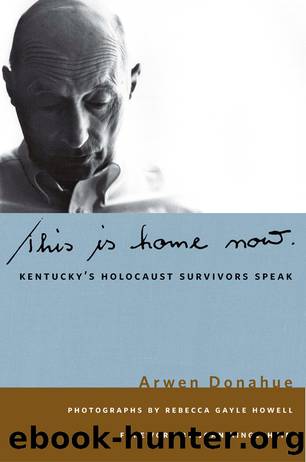This Is Home Now: Kentucky's Holocaust Survivors Speak by Arwen Donahue

Author:Arwen Donahue [Donahue, Arwen]
Language: eng
Format: epub
Tags: history, Jewish, United States, State & Local, South (AL; AR; FL; GA; KY; LA; MS; NC; SC; TN; VA; WV), Holocaust, Social Science, Emigration & Immigration, sociology, Rural, Jewish Studies, Regional Studies
ISBN: 9780813173429
Google: WaVKEalpiBoC
Publisher: University Press of Kentucky
Published: 2009-06-26T00:11:01.281523+00:00
SYLVIA GREEN
OSCAR HABER
OSCAR HABER
ROBERT HOLCZER
ABOVE AND RIGHT: ABRAM JAKUBOWICZ
ANN KLEIN
JUSTINE LERNER
JUSTINE LERNER
ALEXANDER ROSENBERG
ALEXANDER ROSENBERG
JOHN ROSENBERG
JOHN ROSENBERG
JOHN ROSENBERG
PAUL SCHLISSER
PAUL SCHLISSER
CHAPTER 6
Justine Lerner
Justine Lerner was born in BiaÅystok, Poland, in 1923, one of eight children in a close-knit family. Justine was the only member of her family who survived the Holocaust. This interview took place on May 5, 1999, in Justineâs home in Louisville. She had moved to Kentucky only two years before, to be near her son, after sheâd been brutally attacked by a robber in her Brooklyn apartment. Justine had always rejected being interviewed, but now that she was growing older, she felt that it was time to record her story.
JL: My father, may he rest in peace, was a medic in the First World War and he always says that the Germans may put you to work, but they will never harm you in any way. And like anything else, you listen to your parents, whatever they told you. In our town, first came in the Russians. And we were with the Russians maybe a year. Then the Russians left and the Germans came in. When the men went to the temple, they burned down the whole temple with the people inside, whoever it was there. A while later, they put us into the ghetto, and this was terrible. The ghetto was terrible.1
In the ghetto, I had to go out to get some food, because nobody else could. My brother wouldnât go out, he was afraid. And my father couldnât carry anything, so I used to take off the yellow star that we wore. And I was blonde. I went out through a hole they made [in the fence that surrounded the ghetto]. I went to the Poles, the ones that used to do business with my mother. I used to buy from them potatoes and bring it in [to the ghetto], the same way like I came out. And I did it quite often for the family, they should have what to eat.
AD: So, of the children that were left with your parents, you were the main caregiver?
JL: Right. Caregiver. [Two of my sisters] were married already and they had babies, so they couldnât go with us when we were hiding. Because if the kids start crying, the SS will hear.
AD: When did you go into hiding? How did that come about?
JL: Because you heard rumors that theyâre going to take people away from the ghetto. And theyâre going to ship them to Auschwitz. So everybody went in, either to a basement or they built something underneath, and thatâs the way theyâre hiding. You took some water with you or some bread. We heard them walking upstairs, Germans with the boots, and we were underneath. And from nowheres they found out. They knocked on the door. They took us out from there.
People remained after they took us away, of course.2 And you couldnât take nothing with you, because you had to carry it. Just like a pillow case, thatâs where you put your belongings.
Download
This site does not store any files on its server. We only index and link to content provided by other sites. Please contact the content providers to delete copyright contents if any and email us, we'll remove relevant links or contents immediately.
Machine Learning at Scale with H2O by Gregory Keys | David Whiting(4281)
Never by Ken Follett(3918)
Harry Potter and the Goblet Of Fire by J.K. Rowling(3834)
Unfinished: A Memoir by Priyanka Chopra Jonas(3361)
Fairy Tale by Stephen King(3354)
The Man Who Died Twice by Richard Osman(3055)
Will by Will Smith(2891)
Rationality by Steven Pinker(2340)
It Starts With Us (It Ends with Us #2) by Colleen Hoover(2317)
Can't Hurt Me: Master Your Mind and Defy the Odds - Clean Edition by David Goggins(2309)
The Dark Hours by Michael Connelly(2289)
The Storyteller by Dave Grohl(2211)
Friends, Lovers, and the Big Terrible Thing by Matthew Perry(2208)
The Dawn of Everything: A New History of Humanity by David Graeber & David Wengrow(2177)
The Becoming by Nora Roberts(2177)
The Stranger in the Lifeboat by Mitch Albom(2104)
Cloud Cuckoo Land by Anthony Doerr(2080)
Love on the Brain by Ali Hazelwood(2046)
Einstein: His Life and Universe by Walter Isaacson(1997)
